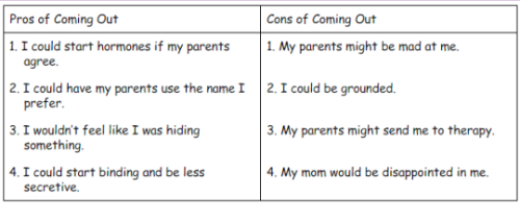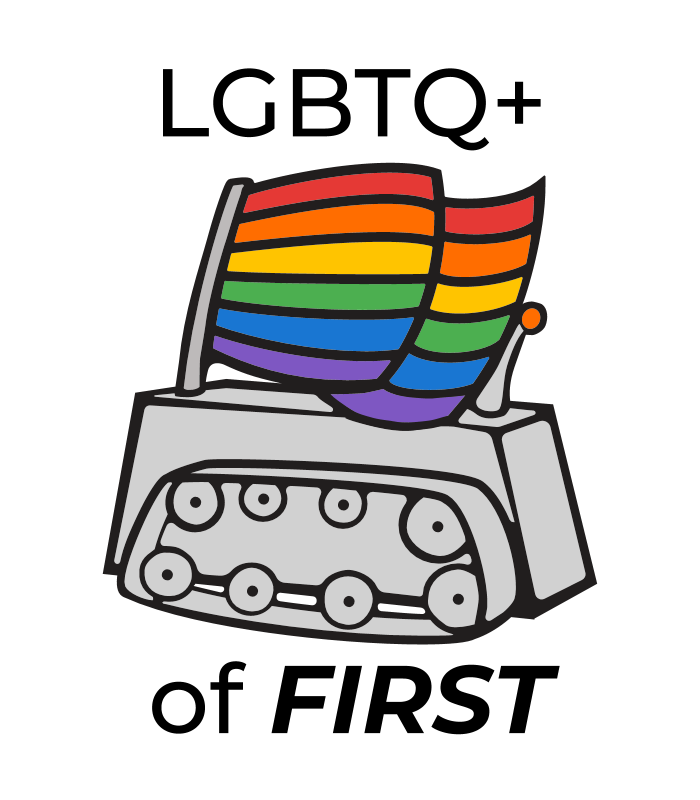|
I have been involved with FIRST for ten years now. My first brush with it was at a summer camp held by an FIRST LEGO League team – my mother had to make me go, and I’m glad she did. After ‘aging out’ of FLL, I joined a FIRST Tech Challenge team and continued with the FTC program until I graduated, as well as staying involved as an active volunteer with FLL. FIRST has changed my life, given me experiences I would have never had the opportunity for otherwise, and given me an amazing community that I’m proud to be a part of.
My last couple years in high school I began to struggle with my gender identity. I can’t say that that was the beginning of my questioning, but that’s when I really began to have to accept things about myself and figure out words to put to my experiences. As I slowly started to come to terms with being transgender, I also slowly began to feel more alienated in a lot of spaces . I wrestled with the idea of ostracised if I came out, and of losing communities that meant a lot to me- namely the FIRST community. I didn’t really feel as if I felt a part of anything outside of FIRST. By the time I was ready to come out, I had graduated high school and was promoted to a key volunteer role in the same state I grew up in, and also served at the Super Regional and World Championship levels. And I was terrified to tell anyone the truth. I was part of enough circles and relatively tight communities that I knew I would be facing a lot of scrutiny, and the idea of being harshly judged in places that meant so much to me was a heavy prospect. When I finally came out to my parents, I told them that they could tell anyone else they wanted, as long as they weren’t people in FIRST circles. It was a very difficult time in my life. Looking back now, I wish I had come out sooner, because the support and acceptance I have found in my FIRST community has been more than I ever expected. Reactions and adjustments from mentors and fellow volunteers have varied, but overall the positive reception has been wonderful. FIRST headquarters have worked with me to make sure my volunteer registration account was correct, and has been very thoughtful with housing accommodations for me as a transgender individual as I took a larger role in the FIRST volunteer world. One reason that I feel as if what LGBTQ+ of FIRST is doing is so important is because I know that coming out would have been easier if I had seen other transgender people- or even gay, lesbian or bisexual people- being visibly accepted in FIRST spaces and known that I had one less thing to fear. I now know many, and I am thankful for that. FIRST as an organization encourages diversity and acceptance, and I am glad that in the last few years a push has been made to make sure that the LGBT community is included in that. Being an LGBT adolescent is difficult, and it is my sincere hope that the FIRST community is a haven for more of these young people than it is an additional stressor. For anyone who is wrestling with similar circumstances as I did, I hope you are able to make that step soon. Whether you are a student, a volunteer or a mentor, there are people behind you and people next to you who want you to be able to live your most genuine life. This was written by a contributor to LGBTQ+ of FIRST who would prefer not to be named. The notion of “coming out” is one that can be intimidating to a lot of people. Formally telling the people in your life about your sexuality seems a daunting task. This, among other reasons, is why I personally choose to be extremely open about my sexuality, with people in my regular life and on my robotics team. I openly discuss/mention my sexuality with people in my life and on my team, but I don’t make a point of specifically coming out. I am unapologetically bisexual.
But it wasn’t always that way. In order to live this way, being able to feel comfortable and secure is absolutely essential. When everyone around you knows that you’re bi (or any other orientation/identity), you will face some judgement and questions. You cannot let those things put doubt in your mind, you know who you are better than anyone else does. Reaching this point of stability in your identity can take a long time. For me it took several months, but for some people it could take years. That is okay. Once you reach this point, you may make the choice to be extremely open with your identity, or you may wish to be more private or reserved. The decision of how open to be with your sexuality/identity is entirely yours. But I’d like to share some pros and cons of being as open as I am and how they affected my decision to be who I am so publicly. Pros
Cons
How I Made My Decision Here I listed a few of the major pros and cons I considered when I decided I wanted to be extremely open. These can differ from person to person and their impact and importance can vary as well.Deciding whether you want to be more reserved or extremely open with your sexuality/identity is entirely up to you. You have to be comfortable in your own skin and be sure of who you are. You also have to evaluate the safety of being open about your sexuality in your current situation. It also has to be something you want, it simply isn’t for anyone. But for me, it has worked out very well and made me quite happy. Hopefully you find what’s comfortable for you and it makes you happy. -Hailee 1747 FIRST and foremost, coming out is entirely up to you. Coming out doesn’t make you more LGBTQ+. If you are closeted, you are not lying to anyone. You don’t owe the details of your sexuality or gender or sex to anyone. So, how you do know if you should come out? First, you should make sure coming out is safe for you. Will you be kicked out of home? Will you be in physical or psychological danger? If so, you have to weigh the pros and cons of coming out. Is the joy of finally being free worth the possible harm? If you’re having trouble, try looking at a physical representation of the pros and cons through a t chart. Mine looked a little like this: If your chart as an equal amount of pros and cons, you can assign numbers for how likely each pro or con is to happen. Pros are positive numbers 1 to 5 and cons are negative numbers -1 to -5. Something like “I wouldn’t feel like I was hiding something” would be (in my situation) a +5 but a “My parents might be mad at me” (in my situation) would be a -4. If you add up your list and end with a net positive, then you should consider coming out. If you end up with a net negative, you should further consider the safety of coming out. Make sure to also take the value of each situation into account. How much do you care about your parents being mad at you? Could you handle the negatives? Even if you end in a net positive, make sure to think about whether or not you could handle the negative outcomes.
Of course, you don’t have to come out to everyone at once, but remember, the more people who know, the more likely the information is to spread. If you aren’t completely out, make sure you are only coming out to trustworthy people who will not “out” you to others. Finally, no matter if you end with a positive or negative number, make sure you make a plan for the worst case scenario. If you are kicked out, do you have a place to stay? If you are forced into therapy, do you have the help of a reputable psychologist to convince your parents the idea is unsafe? If you would face physical violence, are you prepared to defend yourself? Your personal safety comes FIRST, and neither choice is wrong. Coming out is difficult and potentially dangerous, but it can also lead to so much happiness and joy. The decision is entirely up to you, so stay safe and good luck! -Sean 5113 |
About LGBTQ+ of FIRST
LGBTQ+ of FIRST is a student run organization that advocates awareness and acceptance of LGBTQ+ students, mentors, and volunteers of FIRST Robotics. LGBTQ+ of FIRST reaches out to over 1000 members across the FIRST regions and fronts multiple outreach endeavors. Archives
June 2024
Categories
All
|



 RSS Feed
RSS Feed
